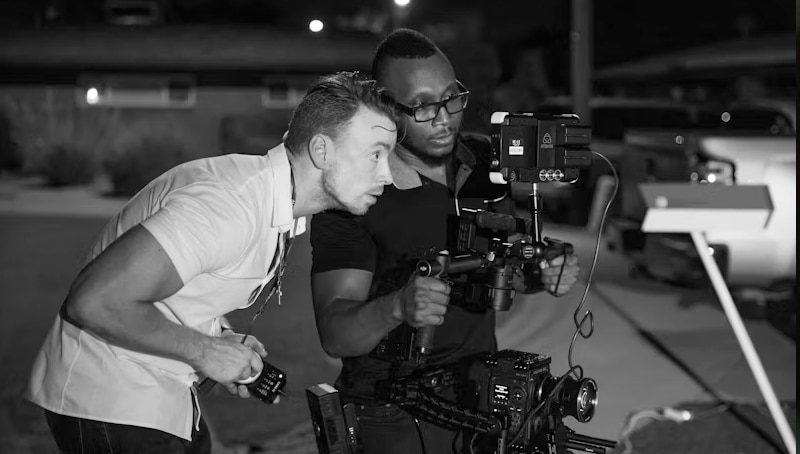FLM 104: Directing
Develop your directorial vision
What does it mean to direct a movie? Directing has been compared to many things, ranging from leading an army into battle to managing a corporation. In this course, you'll gain hands-on experience of many aspects of directing including interpreting a script, using camera movement, sound design, and working with actors. Throughout the course, there is a focus on what makes a director's work distinctive and how you begin to develop those qualities in your work. In the final project, you will test your ability to creatively interpret a script for the screen in your own unique style.

About This Course
Project-Based Learning
Examine the work of a respected director and reflect on what makes their work distinctive. Experiment with telling a story through movement and audio content to create a video montage to capture the essence of a space. Conceptualize, shoot, and edit multiple scenes to create a dramatically interesting story with a beginning, middle, and end.
What Skills Will I Develop?
Students in this course can expect to learn to:
- Generate, plan, and execute coherent ideas for staging and shooting scenes, working from a script.
- Apply camera movement techniques to capture motivated motion shots and sequences.
- Apply basic sound recording and production techniques to create soundtracks with realistic and dramatic elements.
- Apply strategies and concepts for working with actors to achieve dramatic goals for on screen stories or scenes.
- Identify and apply concepts for directing film and digital media projects.
What Software and Supplies Do I Need?
To take this course, you'll need:
- A computer with Internet connection (56 Kbps modem or faster).
- Non-linear video editing software such as Adobe Premiere Pro, Avid, Final Cut Pro, or iMovie.
- Projects in this class can be completed using your mobile device, a point-and-shoot, or a consumer-level DSLR. If you have access to a professional camera, that’s great but not required.
- Ability to connect your video device, (as described above) to a computer to capture footage.
- Professional lights are not required for this course. Household, repurposed items, and natural light can be used to complete course assignments.
Are There Course Prerequisites?
FLM 101 Cinematography is the prerequisite for this course or the courses can be taken concurrently.
If you have any questions about this course, please contact Admissions@sessions.edu.
Course Instructor(s)
The course is taught by the following instructor(s):

André Robert Lee is a filmmaker, keynote speaker, consultant, writer, and educator. His process includes Many Things; New York City Public Schools, The Ford Foundation, Miramax Films, Urbanworld, Film Movement, Diana Ross, BET, Paramount TV, and more.
View all Faculty
Course Outline
Introduction to Directing and Translating Script Pages
What does it mean to direct a movie? In the Intro to Directing lecture, it's compared to many things, including leading an army into battle or managing a corporation. By exploring the different approaches of esteemed directors, you will explore how a director channels the work of hundreds of talented actors, screenwriters, DPs, and more, into a coherent vision.
The Moving Camera & Movement - Practical
Camera movement can be an important tool for a director. We will look at examples of camera movement that are used in filmmaking to support a story. We will look at different examples of camera motion techniques—pans, tilts, tracking shots, hand-held camera, and zooms—and examine how they create a mood or explore the psychology of the characters on screen.
Production Audio Basics
When you are planning how to direct a movie or scene, don't neglect the importance of audio. In this lecture we will examine the different kinds of audio that are integral to a movie, including dialogue, sounds effects (SFX) and background noises (BG), foley, and music.
Actors—Faces, Eyes, Words, and Bodies
When we watch a movie, our attention is generally focused on the characters depicted on screen, played by actors. In this lecture, we'll explore techniques and concepts that a director can use for working with actors, to get the most out of their human subjects.
Vision and Sensibility
Memorable movies aren't created by mechanically assembling shots or copying other filmmakers. In this lecture, we will revisit the question of how a director develops their own distinct, identifiable vision or style. There is no one answer to this question, so in this lecture we will look at examples from great film directors, exploring how a focus on certain kinds of stories, actors, types of shots, production methods—and more—help define their work.
Final Project: Be the Director
In this final project, you will use all your filmmaking skills to bring a script to life. This task is not just about filming; it's about interpreting, envisioning, and crafting a story through your unique perspective. Working from a provided script, you will direct and shoot a short 2-3 minute scene, making crucial decisions about characters, settings, and shot composition, translating words on a page into a compelling visual narrative.
Frequently Asked Questions (FAQ)
How Do The Courses Work?
Our courses are project-based and instructor-led. In each course you’ll complete a series of lectures, projects, discussions, and critiques designed to stretch your creative skills. Weekly assignment deadlines keep you on track, and with no set-logins or Zoom meetings, you can build your studies around your schedule.
Who Are The Instructors?
Our courses are developed and taught by our industry-leading faculty of creative professionals. This means that you’ll learn in-demand skills, get feedback on your work, and build a portfolio of creative work. View our Student Gallery for featured student projects.
When Can I Start?
Classes start January, April, and August, and this course is completed in a 15-week term. This course is not available for individual enrollment; it can only be taken as part of a program.
Explore our Programs: Bachelor's Degree | Associate Degree | Undergraduate Certificate
How Do I Register?
This course is not available for individual enrollment; it can only be taken as part of a program. To register for a program, complete our program application.
Is Sessions College Accredited?
Yes. Since 2001, Sessions College has been accredited by the Distance Education Accrediting Commission (DEAC). The Distance Education Accrediting Commission is listed by the U.S. Department of Education as a recognized accrediting agency and is recognized by the Council for Higher Education Accreditation (CHEA).
RELATED PROGRAMS AT SESSIONS COLLEGE:

